Charles E W Bean, Diaries, AWM38 3DRL 606/237/1 - October 1914 - 1918 - Part 10
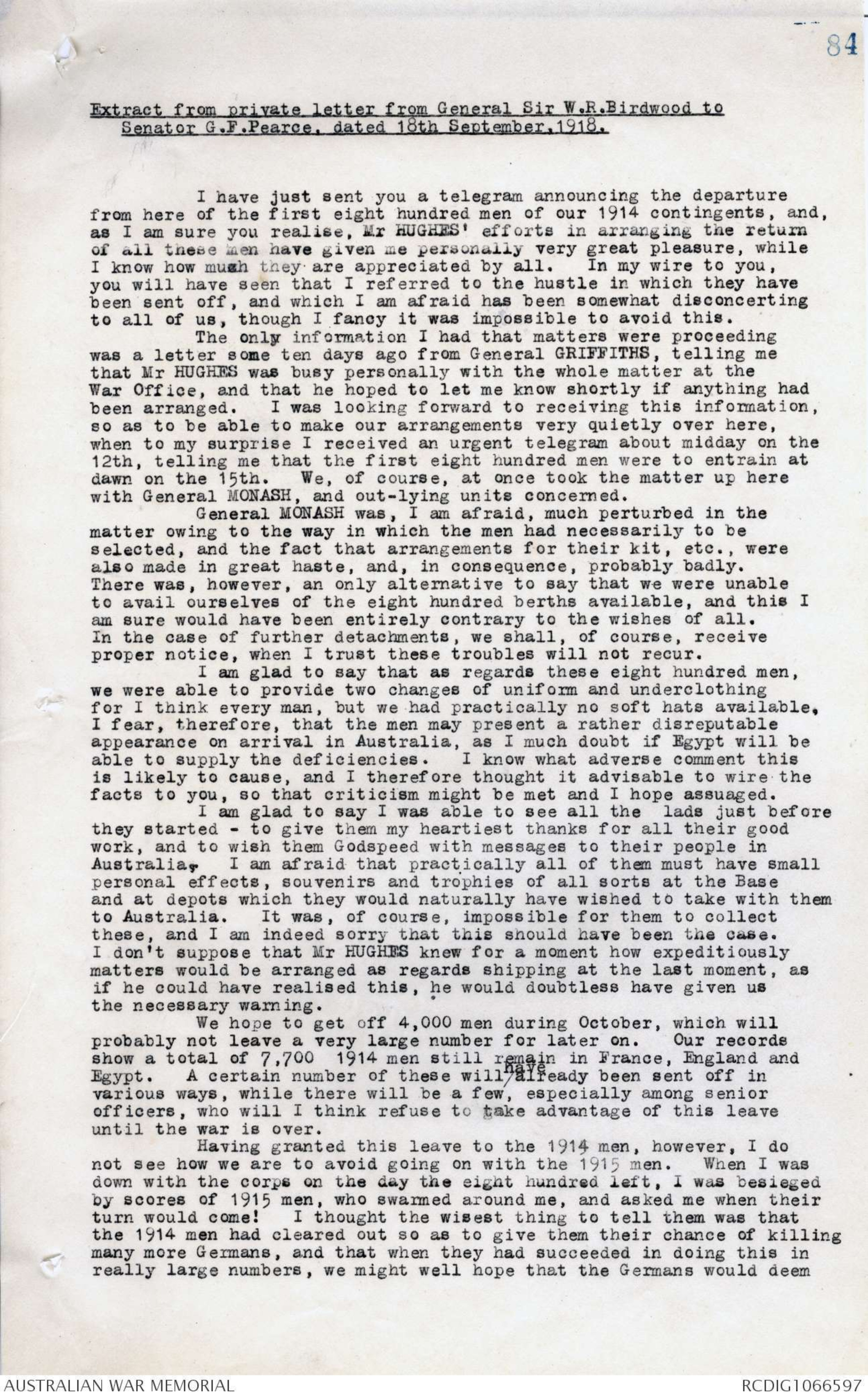
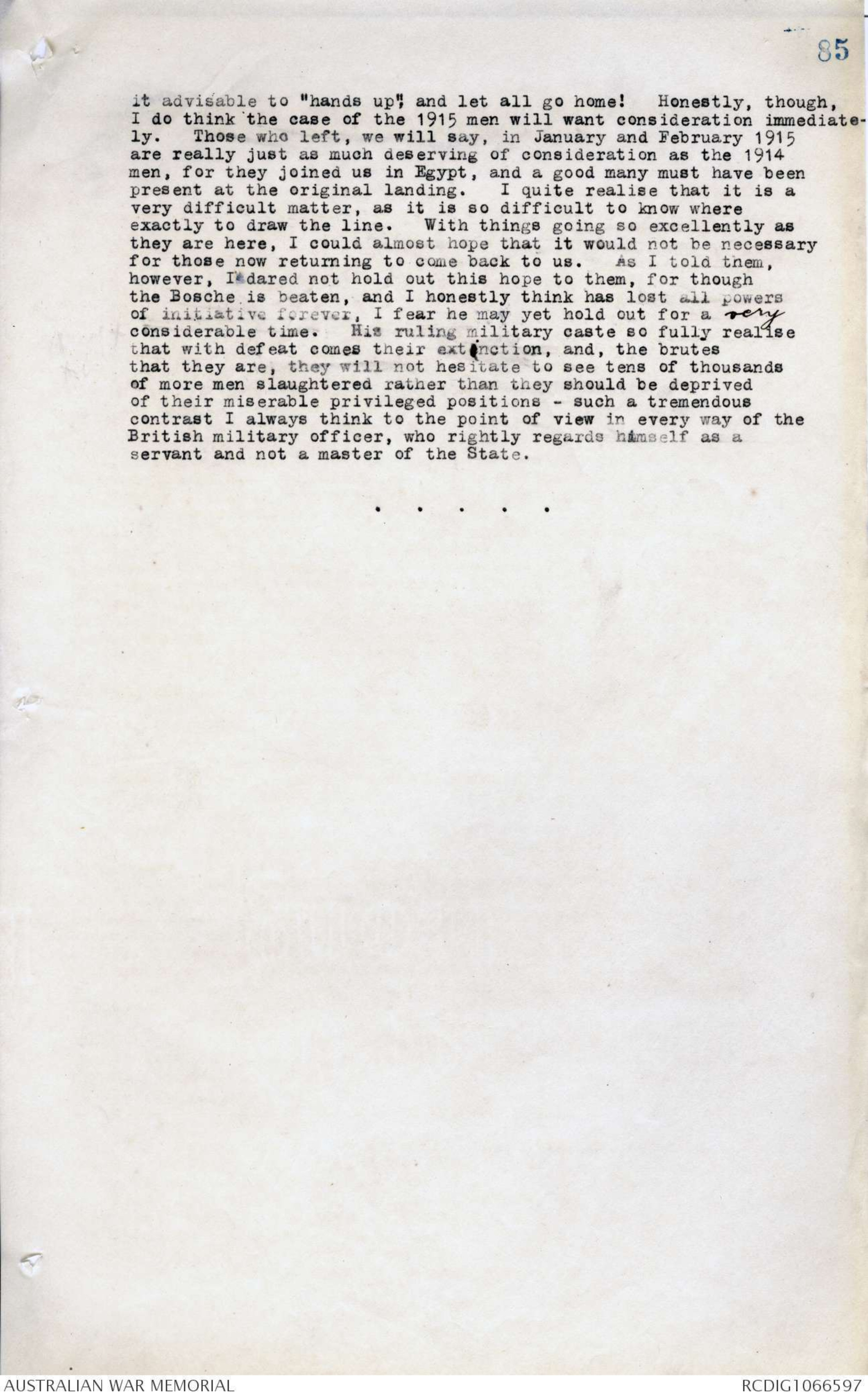
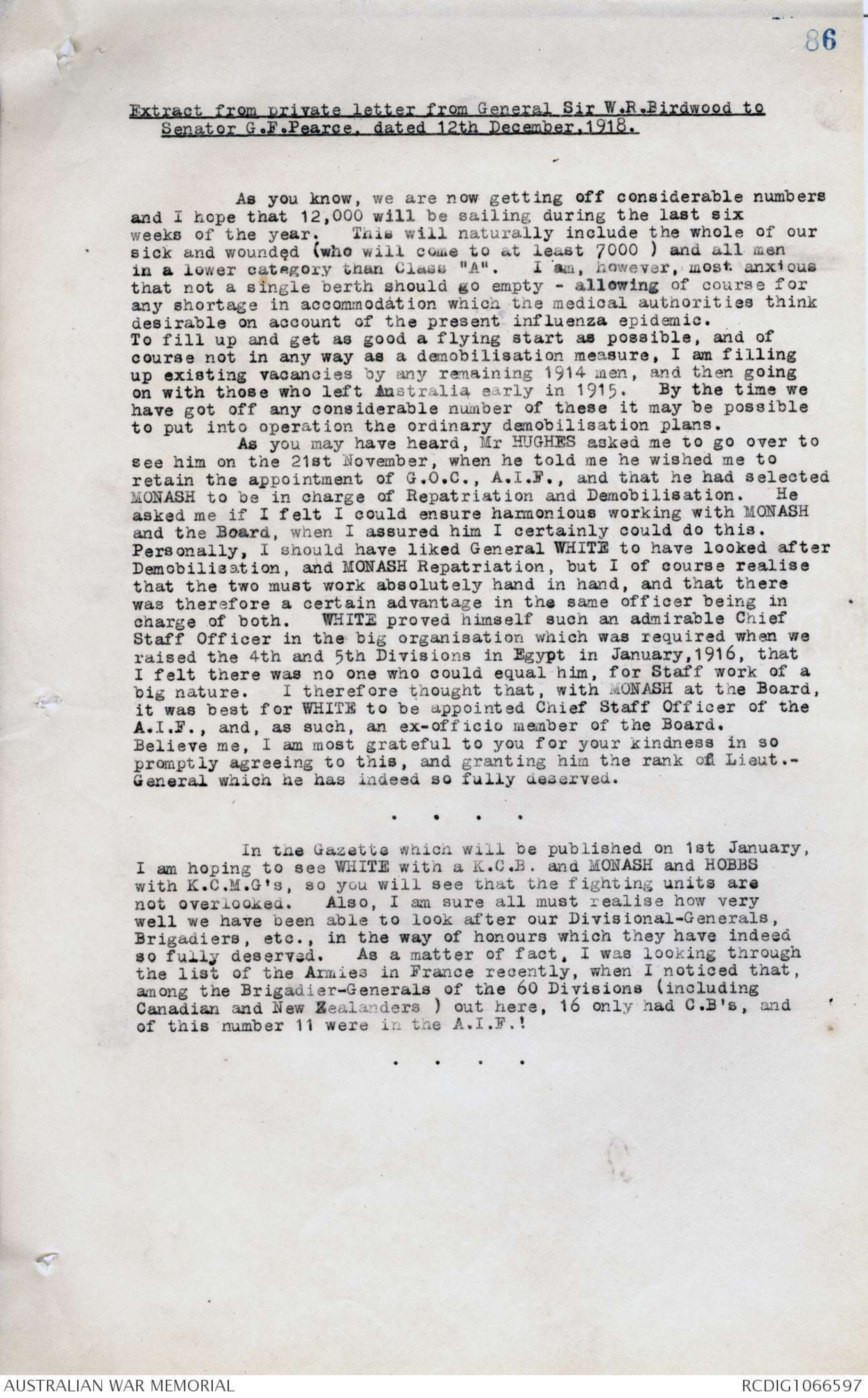
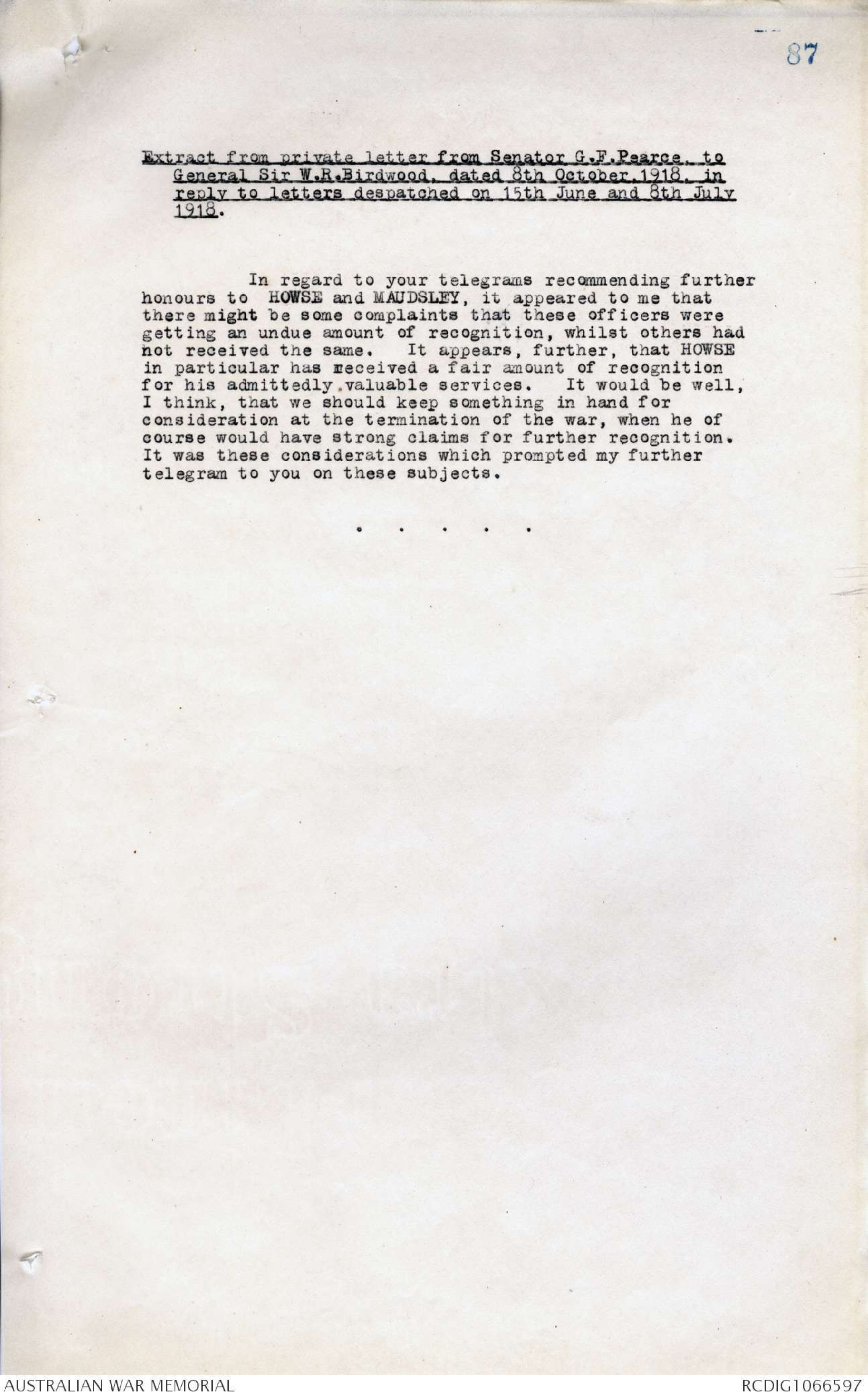
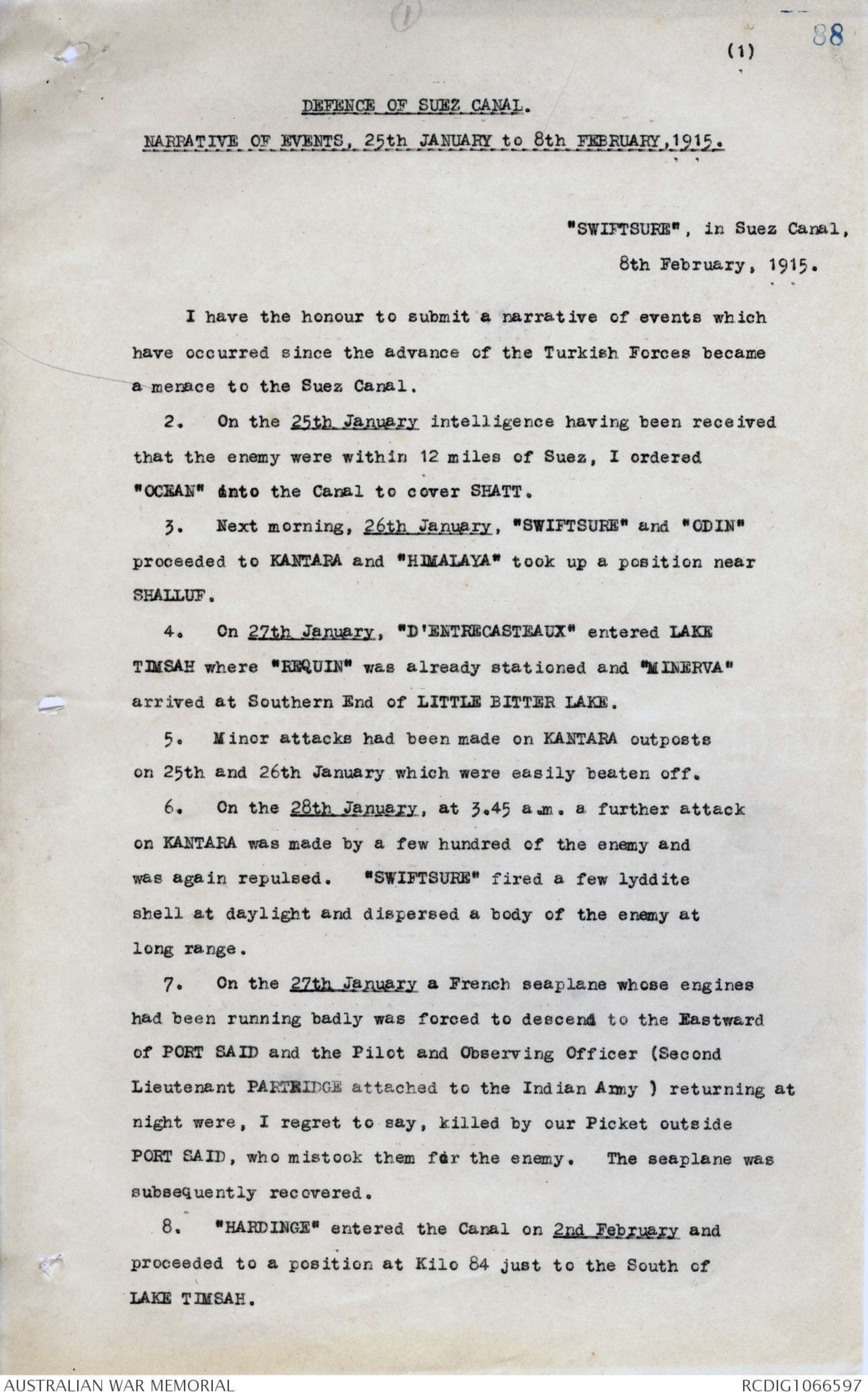
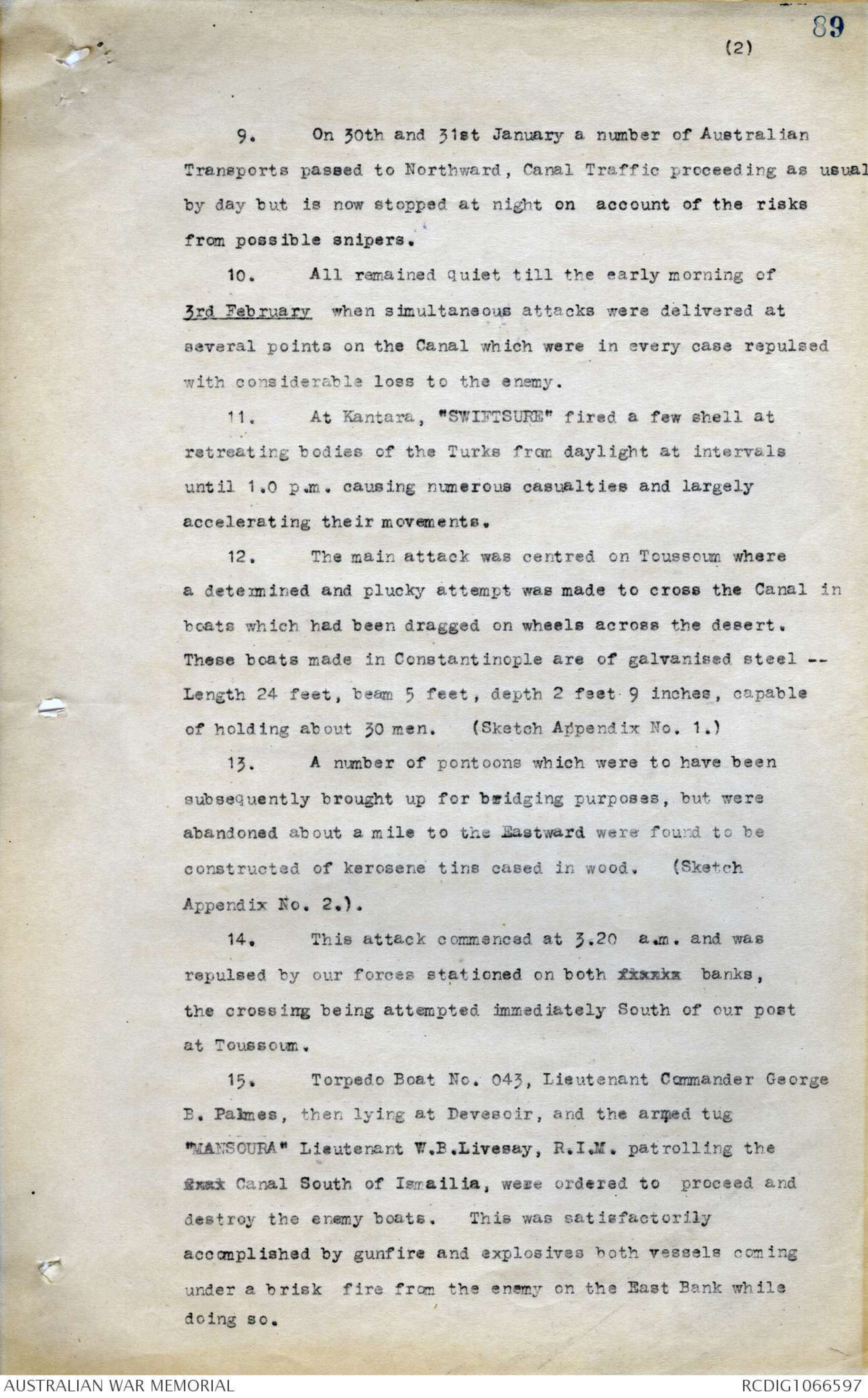
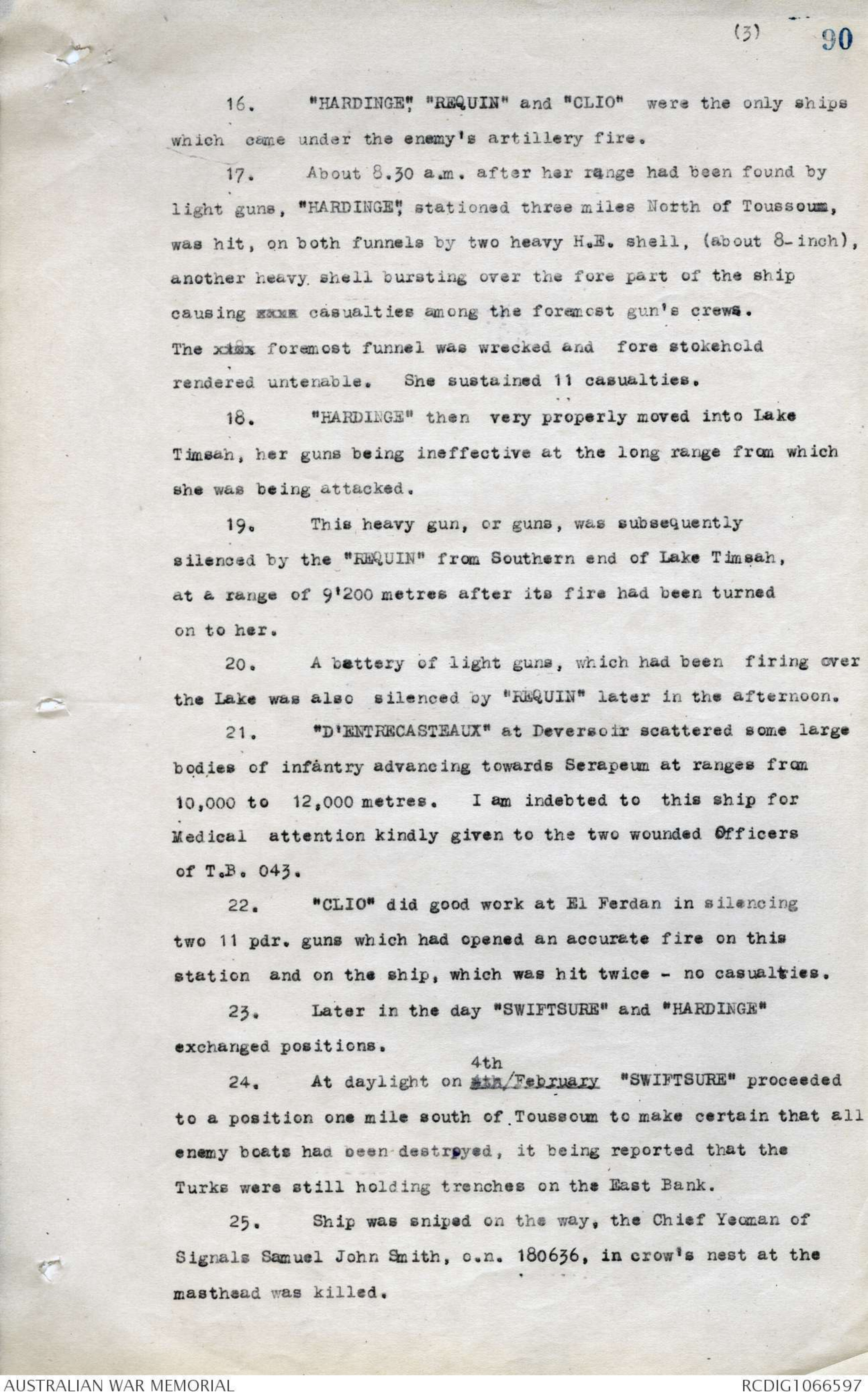
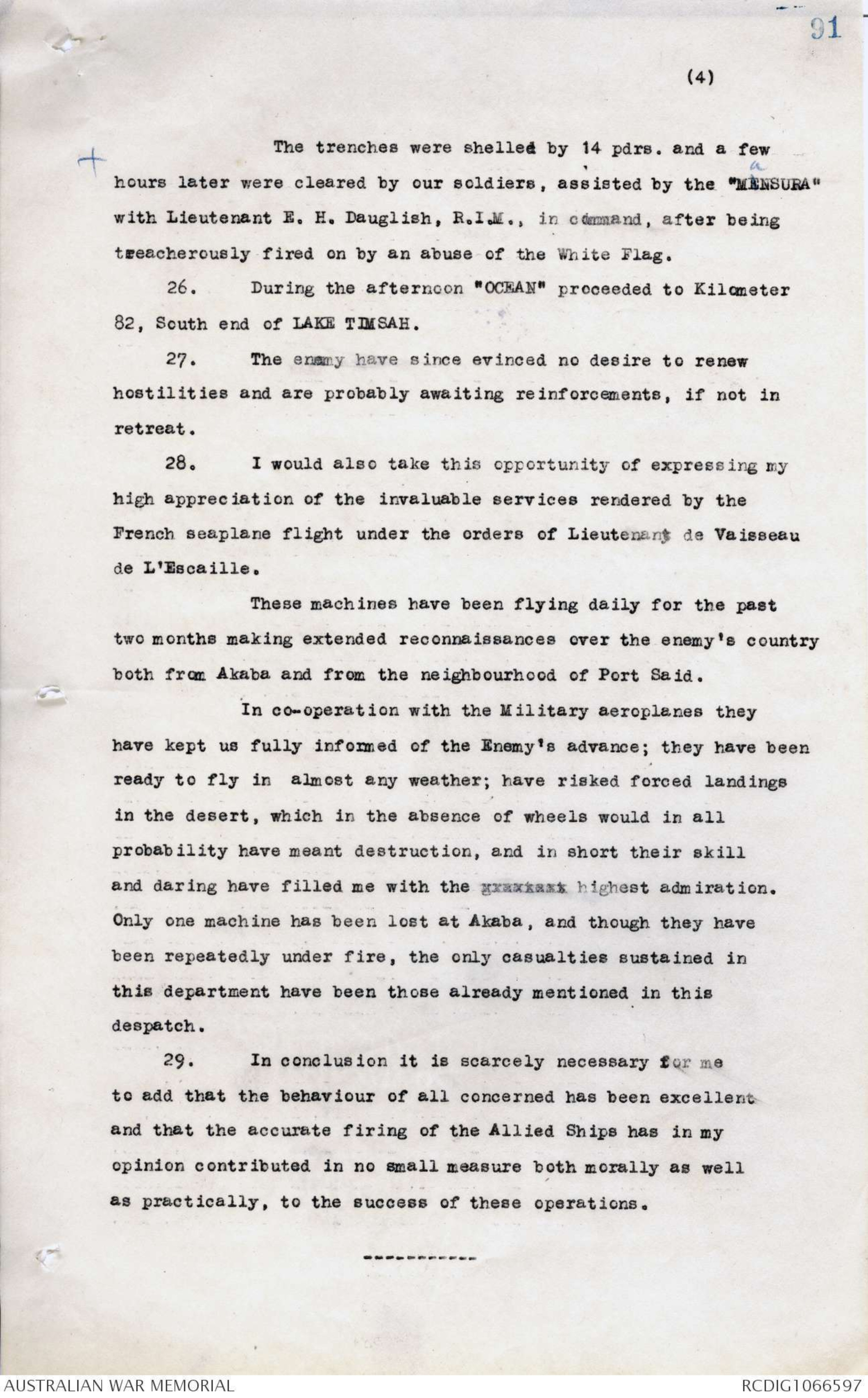
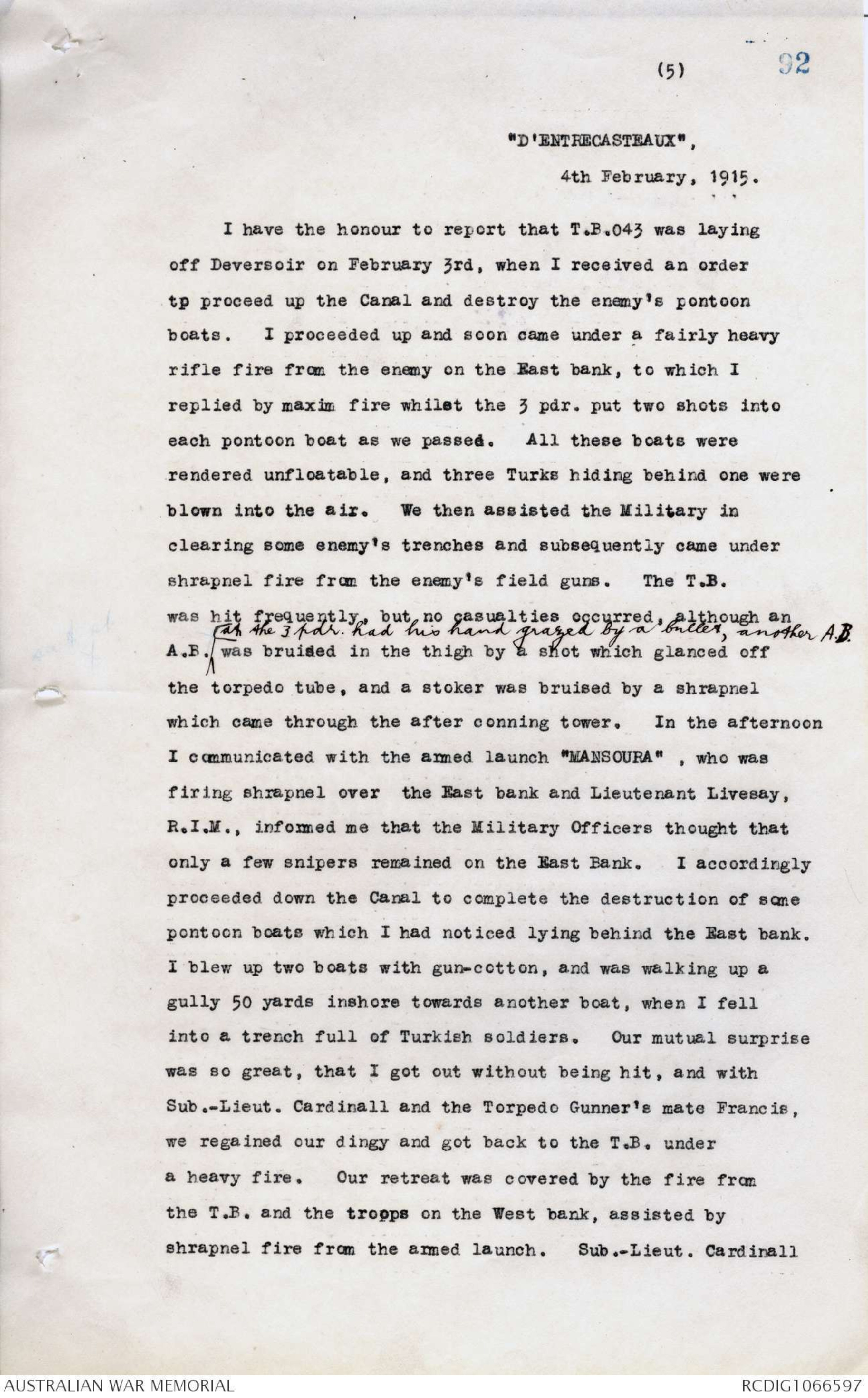
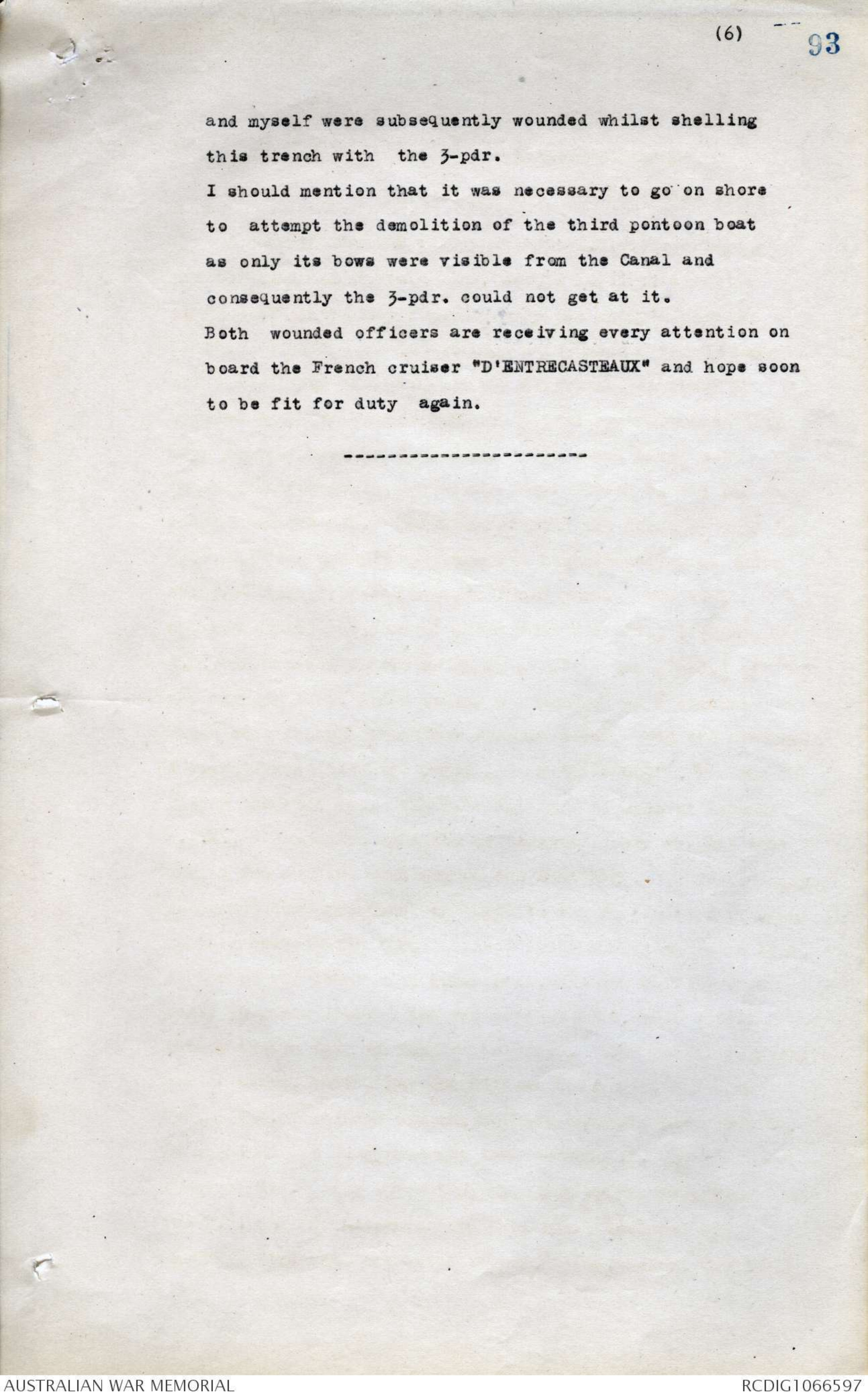
84
Extract from private letter from General Sir W.R.Birdwood to
Senator G.F.Pearce, dated 18th September. 1918.
I have just sent you a telegram announcing the departure
from here of the first eight hundred men of our 1914 contingents, and,
as I am sure you realise, Mr HUGHES' efforts in arranging the return
of all these men have given me personally very great pleasure, while
I know how much they are appreciated by all. In my wire to you,
you will have seen that I referred to the hustle in which they have
been sent off, and which I am afraid has been somewhat disconcerting
to all of us, though I fancy it was impossible to avoid this.
The only information I had that matters were proceeding
was a letter some ten days ago from General GRIFFITHS, telling me
that Mr HUGHES was busy personally with the whole matter at the
War Office, and that he hoped to let me know shortly if anything had
been arranged. I was looking forward to receiving this information,
so as to be able to make our arrangements very quietly over here,
when to my surprise I received an urgent telegram about midday on the
12th, telling me that the first eight hundred men were to entrain at
dawn on the 15th. We, of course, at once took the matter up here
with General MONASH, and out-lying units concerned.
General MONASH was, I am afraid, much perturbed in the
matter owing to the way in which the men had necessarily to be
selected, and the fact that arrangements for their kit, etc., were
also made in great haste, and, in consequence, probably badly.
There was, however, an only alternative to say that we were unable
to avail ourselves of the eight hundred berths available, and this I
am sure would have been entirely contrary to the wishes of all.
In the case of further detachments, we shall, of course, receive
proper notice, when I trust these troubles will not recur.
I am glad to say that as regards these eight hundred men,
we were able to provide two changes of uniform and underclothing
for I think every man, but we had practically no soft hats available,
I fear, therefore, that the men may present a rather disreputable
appearance on arrival in Australia, as I much doubt if Egypt will be
able to supply the deficiencies. I know what adverse comment this
is likely to cause, and I therefore thought it advisable to wire the
facts to you, so that criticism might be met and I hope assuaged.
I am glad to say I was able to see all the lads just before
they started - to give them my heartiest thanks for all their good
work, and to wish them Godspeed with messages to their people in
Australia. I am afraid that practically all of them must have small
personal effects, souvenirs and trophies of all sorts at the Base
and at depots which they would naturally have wished to take with them
to Australia. It was, of course, impossible for them to collect
these, and I am indeed sorry that this should have been the case.
I don't suppose that Mr HUGHES knew for a moment how expeditiously
matters would be arranged as regards shipping at the last moment, as
if he could have realised this, he would doubtless have given us
the necessary warning.
We hope to get off 4,000 men during October, which will
probably not leave a very large number for later on. Our records
show a total of 7,700 1914 men still remain in France, England and
Egypt. A certain number of these will ^have already been sent off in
various ways, while there will be a few, especially among senior
officers, who will I think refuse to take advantage of this leave
until the war is over.
Having granted this leave to the 1914 men, however, I do
not see how we are to avoid going on with the 1915 men. When I was
down with the corps on the day the eight hundred left, I was besieged
by scores of 1915 men, who swarmed around me, and asked me when their
turn would come! I thought the wisest thing to tell them was that
the 1914 men had cleared out so as to give them their chance of killing
many more Germans, and that when they had succeeded in doing this in
really large numbers, we might well hope that the Germans would deem
85
it advisable to "hands up", and let all go home! Honestly, though,
I do think the case of the 1915 men will want consideration immediately.
Those who left, we will say, in January and February 1915
are really just as much deserving of consideration as the 1914
men, for they joined us in Egypt, and a good many must have been
present at the original landing. I quite realise that it is a
very difficult matter, as it is so difficult to know where
exactly to draw the line. With things going so excellently as
they are here, I could almost hope that it would not be necessary
for those now returning to come back to us. As I told them,
however, I dared not hold out this hope to them, for though
the Bosche is beaten, and I honestly think has lost all powers
of initiative forever, I fear he may yet hold out for a very
considerable time. His ruling military caste so fully realise
that with defeat comes their extinction, and, the brutes
that they are, they will not hesitate to see tens of thousands
of more men slaughtered rather than they should be deprived
of their miserable privileged positions - such a tremendous
contrast I always think to the point of view in every way of the
British military officer, who rightly regards himself as a
servant and not a master of the State.
86
Extract from private letter from General Sir W.R.Birdwood to
Senator G.F.Pearce, dated 12th December. 1918.
As you know, we are now getting off considerable numbers
and I hope that 12,000 will be sailing during the last six
weeks of the year. This will naturally include the whole of our
sick and wounded (who will come to at least 7000 ) and all men
in a lower category than Class "A". I am, however, most anxious
that not a single berth should go empty - allowing of course for
any shortage in accommodation which the medical authorities think
desirable on account of the present influenza epidemic.
To fill up and get as good a flying start as possible, and of
course not in any way as a demobilisation measure, I am filling
up existing vacancies by any remaining 1914 men, and then going
on with those who left Australia early in 1915. By the time we
have got off any considerable number of these it may be possible
to put into operation the ordinary demobilisation plans.
As you may have heard, Mr HUGHES asked me to go over to
see him on the 21st November, when he told me he wished me to
retain the appointment of G.O.C., A.I.F., and that he had selected
MONASH to be in charge of Repatriation and Demobilisation. He
asked me if I felt I could ensure harmonious working with MONASH
and the Board, when I assured him I certainly could do this.
Personally, I should have liked General WHITE to have looked after
Demobilisation, and MONASH Repatriation, but I of course realise
that the two must work absolutely hand in hand, and that there
was therefore a certain advantage in the same officer being in
charge of both. WHITE proved himself such an admirable Chief
Staff Officer in the big organisation which was required when we
raised the 4th and 5th Divisions in Egypt in January, 1916, that
I felt there was no one who could equal him, for Staff work of a
big nature. I therefore thought that, with MONASH at the Board,
it was best for WHITE to be appointed Chief Staff Officer of the
A.I.F., and, as such, an ex-officio member of the Board.
Believe me, I am most grateful to you for your kindness in so
promptly agreeing to this, and granting him the rank of Lieut.-General
which he has indeed so fully deserved.
In the Gazette which will be published on 1st January,
I am hoping to see WHITE with a K.C.B. and MONASH and HOBBS
with K.C.M.G's, so you will see that the fighting units are
not overlooked. Also, I am sure all must realise how very
well we have been able to look after our Divisional-Generals,
Brigadiers, etc., in the way of honours which they have indeed
so fully deserved. As a matter of fact, I was looking through
the list of the Armies in France recently, when I noticed that,
among the Brigadier-Generals of the 60 Divisions (including
Canadian and New Zealanders ) out here, 16 only had C.B's, and
of this number 11 were in the A.I.F.!
87
Extract from private letter from Senator G.F.Pearce. to
General Sir W.R.Birdwood, dated 8th October 1918. in
reply to letters despatched on 15th June and 8th July
1918.
In regard to your telegrams recommending further
honours to HOWSE and MAUDSLEY, it appeared to me that
there might be some complaints that these officers were
getting an undue amount of recognition, whilst others had
not received the same. It appears, further, that HOWSE
in particular has received a fair amount of recognition
for his admittedly valuable services. It would be well,
I think, that we should keep something in hand for
consideration at the termination of the war, when he of
course would have strong claims for further recognition.
It was these considerations which prompted my further
telegram to you on these subjects.
(1)
(1) 88
DEFENCE OF SUEZ CANAL.
NARRATIVE OF EVENTS, 25th JANUARY to 8th FEBRUARY, 1915.
"SWIFTSURE", in Suez Canal,
8th February, 1915.
I have the honour to submit a narrative of events which
have occurred since the advance of the Turkish Forces became
a menace to the Suez Canal.
2. On the 25th January intelligence having been received
that the enemy were within 12 miles of Suez, I ordered
"OCEAN" into the Canal to cover SHATT.
3. Next morning, 26th January, "SWIFTSURE" and "ODIN"
proceeded to KANTARA and "HIMALAYA" took up a position near
SHALLUF.
4. On 27th January, 'D'ENTRECASTEAUX" entered LAKE
TIMSAH where "REQUIN" was already stationed and "MINERVA'
arrived at Southern End of LITTLE BITTER LAKE.
5. Minor attacks had been made on KANTARA outposts
on 25th and 26th January which were easily beaten off.
6. On the 28th January, at 3.45 a.m. a further attack
on KANTARA was made by a few hundred of the enemy and
was again repulsed. "SWIFTSURE" fired a few lyddite
shell at daylight and dispersed a body of the enemy at
long range.
7. On the 27th January a French seaplane whose engines
had been running badly was forced to descend to the Eastward
of PORT SAID and the Pilot and Observing Officer (Second
Lieutenant PARTRIDGE attached to the Indian Army) returning at
night were, I regret to say, killed by our Picket outside
PORT SAID, who mistook them for the enemy. The seaplane was
subsequently recovered.
8. "HARDINGE" entered the Canal on 2nd February and
proceeded to a position at Kilo 84 just to the South of
LAKE TIMSAH.
(2) 89
9. On 30th and 31st January a number of Australian
Transports passed to Northward, Canal Traffic proceeding as usual
by day but is now stopped at night on account of the risks
from possible snipers.
10. All remained quiet till the early morning of
3rd February when simultaneous attacks were delivered at
several points on the Canal which were in every case repulsed
with considerable loss to the enemy.
11. At Kantara, "SWIFTSURE" fired a few shell at
retreating bodies of the Turks from daylight at intervals
until 1.0 p.m. causing numerous casualties and largely
accelerating their movements.
12. The main attack was centred on Toussoum where
a determined and plucky attempt was made to cross the Canal in
boats which had been dragged on wheels across the desert.
These boats made in Constantinople are of galvanised steel --
Length 24 feet, beam 5 feet, depth 2 feet 9 inches, capable
of holding about 30 men. (Sketch Appendix No. 1.)
13. A number of pontoons which were to have been
subsequently brought up for bridging purposes, but were
abandoned about a mile to the Eastward were found to be
constructed of kerosene tins cased in wood. (Sketch
Appendix No. 2.).
14. This attack commenced at 3.20 a.m. and was
repulsed by our forces stationed on both flanks banks,
the crossing being attempted immediately South of our post
at Toussoum.
15. Torpedo Boat No. 043, Lieutenant Commander George
B. Palmes, then lying at Devesoir, and the armed tug
"MANSOURA" Lieutenant W.B. Livesay, R.I.M. patrolling theCanl Canal South of Ismailia, were ordered to proceed and
destroy the enemy boats. This was satisfactorily
accomplished by gunfire and explosives both vessels coming
under a brisk fire from the enemy on the East Bank while
doing so.
(3) 90
16. "HARDINGE", "REQUIN" and "CLIO", were the only ships
which came under the enemy's artillery fire.
17. About 8.30 a.m. after her range had been found by
light guns, "HARDINGE", stationed three miles North of Toussoum,
was hit, on both funnels by two heavy H.E. shell, (about 8-inch),
another heavy shell bursting over the fore part of the ship
causing xxxx casualties among the foremost gun's crews.
The xxxx foremost funnel was wrecked and fore stokehold
rendered untenable. She sustained 11 casualties.
18. "HARDINGE" then very properly moved into Lake
Timsah, her guns being ineffective at the long range from which
she was being attacked.
19. This heavy gun, or guns, was subsequently
silenced by the "REQUIN” from Southern end of Lake Timsah,
at a range of 9'200 metres after its fire had been turned
on to her.
20. A battery of light guns, which had been firing over
the Lake was also silenced by "REQUIN" later in the afternoon.
21. "D'ENTRECASTEAUX" at Deversoir scattered some large
bodies of infantry advancing towards Serapeum at ranges from
10,000 to 12,000 metres. I am indebted to this ship for
Medical attention kindly given to the two wounded Officers
of T.B. 043.
22. "CLIO" did good work at El Ferdan in silencing
two 11 pdr. guns which had opened an accurate fire on this
station and on the ship, which was hit twice - no casualties.
23. Later in the day "SWIFTSURE" and "HARDINGE"
exchanged positions.
24. At daylight on 5th ^4th February "SWIFTSURE" proceeded
to a position one mile south of Toussoum to make certain that all
enemy boats had been destroyed, it being reported that the
Turks were still holding trenches on the East Bank.
25. Ship was sniped on the way, the Chief Yeoman of
Signals Samuel John Smith, o.n. 180636, in crow's nest at the
masthead was killed.
(4) 91
The trenches were shelled by 14 pdrs. and a few
[*+*]
hours later were cleared by our soldiers, assisted by the "ME^ANSURA"
with Lieutenant E. H. Dauglish, R.I.M., in command, after being
treacherously fired on by an abuse of the White Flag.
26. During the afternoon "OCEAN" proceeded to Kilometer
82, South end of LAKE TIMSAH.
27. The enemy have since evinced no desire to renew
hostilities and are probably awaiting reinforcements, if not in
retreat.
28. I would also take this opportunity of expressing my
high appreciation of the invaluable services rendered by the
French seaplane flight under the orders of Lieutenant de Vaisseau
de L'Escaille.
These machines have been flying daily for the past
two months making extended reconnaissances over the enemy's country
both from Akaba and from the neighbourhood of Port Said.
In co-operation with the Military aeroplanes they
have kept us fully informed of the Enemy's advance; they have been
ready to fly in almost any weather; have risked forced landings
in the desert, which in the absence of wheels would in all
probability have meant destruction, and in short their skill
and daring have filled me with the xxxxxx highest admiration.
Only one machine has been lost at Akaba, and though they have
been repeatedly under fire, the only casualties sustained in
this department have been those already mentioned in this
despatch.
29. In conclusion it is scarcely necessary for me
to add that the behaviour of all concerned has been excellent
and that the accurate firing of the Allied Ships has in my
opinion contributed in no small measure both morally as well
as practically, to the success of these operations.
(5) 92
"D'ENTRECASTEAUX",
4th February, 1915.
I have the honour to report that T.B.043 was laying
off Deversoir on February 3rd, when I received an order
to proceed up the Canal and destroy the enemy's pontoon
boats. I proceeded up and soon came under a fairly heavy
rifle fire from the enemy on the East bank, to which I
replied by maxim fire whilet the 3 pdr. put two shots into
each pontoon boat as we passed. All these boats were
rendered unfloatable, and three Turks hiding behind one were
blown into the air. We then assisted the Military in
clearing some enemy's trenches and subsequently came under
shrapnel fire from the enemy's field guns. The T.B.
was hit frequently, but, no casualties occurred, although an
A.B. ^at the 3 pdr. had his hand grazed by a bullet, another A.B.
was bruised in the thigh by a shot which glanced off
the torpedo tube, and a stoker was bruised by a shrapnel
which came through the after conning tower. In the afternoon
I communicated with the armed launch "MANSOURA", who was
firing shrapnel over the East bank and Lieutenant Livesay,
R.I.M., informed me that the Military Officers thought that
only a few snipers remained on the East Bank. I accordingly
proceeded down the Canal to complete the destruction of some
pontoon boats which I had noticed lying behind the East bank.
I blew up two boats with gun-cotton, and was walking up a
gully 50 yards inshore towards another boat, when I fell
into a trench full of Turkish soldiers. Our mutual surprise
was so great, that I got out without being hit, and with
Sub.-Lieut. Cardinall and the Torpedo Gunner's mate Francis,
we regained our dingy and got back to the T.B. under
a heavy fire. Our retreat was covered by the fire from
the T.B. and the troops on the West bank, assisted by
shrapnel fire from the armed launch. Sub.-Lieut. Cardinall
(6) 93
and myself were subsequently wounded whilst shelling
this trench with the 3-pdr.
I should mention that it was necessary to go on shore
to attempt the demolition of the third pontoon boat
as only its bows were visible from the Canal and
consequently the 3-pdr. could not get at it.
Both wounded officers are receiving every attention on
board the French cruiser 'D'ENTRECASTEAUX" and hope soon
to be fit for duty again.
 Not Yet Replaced By AI
Not Yet Replaced By AIThis transcription item is now locked to you for editing. To release the lock either Save your changes or Cancel.
This lock will be automatically released after 60 minutes of inactivity.